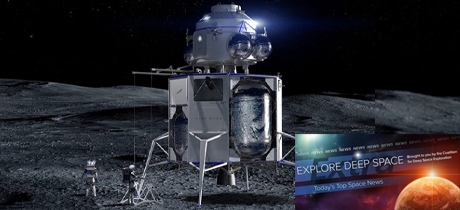In Today’s Deep Space Extra… Boeing’s Orbital Flight Test-2 facing potential weather delay for Friday’s launch. A virtual center called SatHub could provide astronomers with the tools to avoid satellite passes from growing satellite mega-constellations as they pursue their scientific observations.
Human Space Exploration
Weather key issue for Starliner launch
Coalition Members in the News – Boeing, United Launch Alliance
SpaceNews.com (7/27): Orbital Flight Test-2 (OFT-2), the next milestone in the NASA Commercial Crew Program/Boeing initiative to certify the company’s CST-100 Starliner for the regularly scheduled transportation of astronauts to and from the International Space Station (ISS), is scheduled to lift off on Friday at 2:53 p.m., EDT. The forecast, however, includes a threat of afternoon thunderstorms that could prompt a delay for an automated docking with the ISS on Saturday. If unfavorable weather prevails, the next launch attempts would come on August 3 and 4.
Controllers make another orbital correction for Nauka module
Parabolic Arc (7/27): An additional altitude correction maneuver was carried out Tuesday by Russia’s Nauka Multipurpose Laboratory Module. Launched July 21 from the Baikonur Cosmodrome in Kazakhstan, the large Nauka is on a trajectory intended to lead to a docking with the International Space Station’s (ISS) Russian segment on Thursday at 9:24 a.m., EDT. Using the Canadian Space Agency’s (CSA) robotic arm, the ISS’s crew has examined the Zvezda docking port with cameras to ensure an absence of damage or debris.
Jeff Bezos asks NASA for Moon lander contract, offers to cover billions in costs
Coalition Members in the News – Boeing, Lockheed Martin, Northrop Grumman
Space.com (7/27): Jeff Bezos, in an open letter to NASA Administrator Bill Nelson on July 26, reiterated that Blue Origin wants a NASA Moon lander contract — and stressed that it is willing to cover up to $2 billion in development and testing costs if it’s selected. Bezos’ letter comes three months after the Blue Origin-led “National Team” and Dynetics lost out in the final round of the competition to SpaceX, which won a contract valued at $2.9 billion to develop its Starship spacecraft as the Artemis Human Landing System (HLS). Both Dynetics and Blue Origin filed protests with the U.S. Government Accountability Office (GAO) in late April, citing what they saw as flaws in the HLS procurement process. As mandated, NASA will keep hold of the $2.9 billion until the GAO finishes an investigation into the matter, projected to be in August.
Space Science
Astronomers back technical efforts to reduce impacts of satellite megaconstellations while seeking regulatory solutions
SpaceNews.com (7/27): Still in the formative stage, a virtual center called SatHub could provide astronomers with the tools to avoid satellite passes from growing satellite megaconstellations as they pursue their scientific observations. SatHub emerged earlier this month from a weeklong workshop called SATCON 2. “Astronomers are also looking at funding models for SatHub that could include seeking support from the International Astronomical Union, which is soliciting proposals for projects to address the impacts of satellite constellations on astronomy,” SpaceNews.com reports.
German X-ray space telescope captures most complete map of black holes ever
Space.com (7/27): The eROSITA instrument, aboard the Russian German Spectrum-Roentgen-Gamma mission X-ray space telescope launched in 2019, has completed an all sky survey map that reveals more than three million black holes, neutron stars and galaxy clusters. The effort could help to address mysteries over the existence of dark matter and dark energy.
Other News
Cecil Spaceport launches new mission control and tower as plans for Jacksonville’s first space flights continue
Florida Times Union (7/27): Florida state officials hosted a ribbon cutting Tuesday for an 11-story flight control tower and spaceflight facility at the Jacksonville Aviation Authority’s Cecil Air and Spaceport. The new mission control center was named for Norm Thagard, the former NASA astronaut. State officials are looking forward to the former Naval Air Station Cecil Field hosting the launch of its first orbital space mission by mid-2022.

